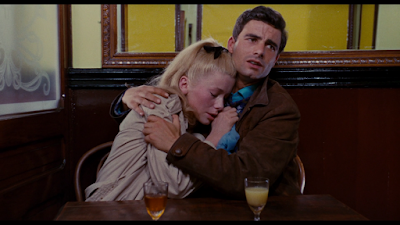Review: The Umbrellas of Cherbourg
 "I want to make people cry," said French New Wave director Jacques Demy, and so he made the film Les Parapluies de Cherbourg (1964).
"I want to make people cry," said French New Wave director Jacques Demy, and so he made the film Les Parapluies de Cherbourg (1964).Titled The Umbrellas of Cherbourg in English, this is the movie which inspired and heavily influenced Damien Chazelle's 2016 film La La Land. It is the story, told entirely in song, of teenage Geneviève who works in her mother's struggling umbrella boutique, and her garage mechanic boyfriend Guy, who is drafted into the French military to fight in the Algerian War. Teenage pregnancy, love triangles, betrayal, angst--seems like a typical, possibly meh plot line.
Wrong.
Right away, as the opening credits begin to roll across a scene, filmed from above, of walkers with brightly colored umbrellas, I know this is something special. Immediately, the viewer can tell he or she is in for a treat, that they are about to watch something beautiful--artistic--extraordinary. The first number begins to play--an instantly engaging jazz introduction, finger-snapping and pulling you in with the first few notes. It is a powerhouse beginning, and you are already smiling.
The wealth of popping color--brilliant greens, pinks, blues, reds, oranges--adds innumerable layers to the visual delight of design and cinematography and opens up to the mind a playground of possible interpretation. The imagination and the analytical brain are set wild.
The choice to set regular dialogue to music was a controversial move by Demy and composer Michel Legrand. Most of the time, it paid off. Some of the time, the singing was a bit of a drag. It affected the ability of the actors to truly act and perform the way they otherwise could have, affecting the ability of the performers to convey their ultimate emotional potential, slowing everything down. All in all, however, these drawbacks (a two-sided issue) positively added to the ambiguity of the storyline later on.
The beauty of the film, firmly established in the first moments, only builds as the experience unfolds and progresses. The characters travel from innocence to maturity, from carefree to scarred. As the final strains of the love theme swell and the last glimpses of the characters fade from view, the viewer is floored. One almost can't decide what to feel--happiness? Sadness?--but you are left feeling, all the same, and intensely. Emotional reactions are inescapable. You are left a bit lost; in this film, there was no good or bad, only decisions, only life as it is in reality. You find yourself unable to pick sides.
Jacques Demy defined "bittersweet."
Throughout the entire movie, the written dialogue is simple, although musical, and the portrayal of the characters and their actions is uncomplicated. The simplicity allows the view to project their own emotions onto the characters, and it becomes personal. The resulting ambiguity shrouds the intended messages of the story--what was the creator saying about love? Were the characters happy? Is this an ending of regret and missed chances, or could it be the complete opposite? The innumerable questions are left unanswered, rendering the film the tiniest bit unfulfilling--but which only serves to cause the movie to live on in the audience's mind, for long after it is finished playing.
After Les Parapluies is over, you're left unsure as to whether or not you liked the movie, but you know without a doubt that it is a great film. It is unique, it pushed the boundaries of cinema (the film could never have been made in America at that time), and, even fifty years later, it still evokes the same intensity, undimmed, of emotional response in the audience. The plot's punch remains sharp, not dulled even a little bit by the erosions of time.
Les Parapluies de Cherbourg is one of those films you are only truly able to experience one time. After your first monumental viewing, it can never be the same. Although still beautiful and incredible every subsequent time, the shock factor of the plot, and its impact on the audience, is one of the many components which makes this movie unforgettable. And it is that transience, like a sunset unable to be fully captured, unable to be fully experienced more than once, that truly makes Les Parapluies a masterpiece.






Comments
Post a Comment